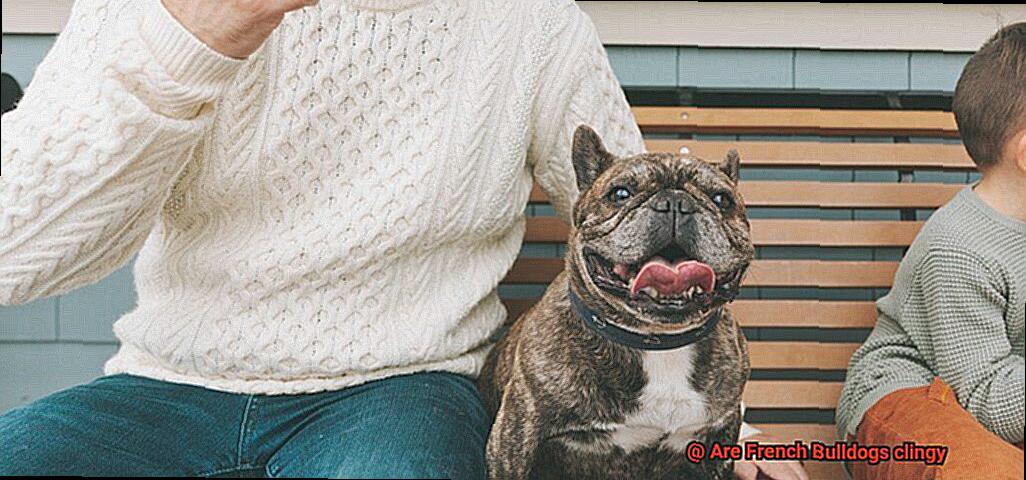Are French Bulldogs clingy?
Introducing the furry little lovebugs who have mastered the art of snuggling, the French Bulldogs.
These pint-sized bundles of adorableness have become all the rage in recent years, and it’s not hard to understand why. With their wrinkled faces and mischievous personalities, French Bulldogs have stolen the hearts of dog enthusiasts around the globe.
But here’s the burning question: do these furry friends have a tendency to be clingy? Well, hold on tight as we embark on a journey into the world of cuddles with these lovable creatures.
Get ready for a delightful adventure through the realm of irresistible clinginess.
Are French Bulldogs Prone to Clinginess?
Contents [show]
But don’t worry, this clinginess is actually a sign of their deep affection and loyalty. In this article, we’ll delve into why French Bulldogs are prone to being clingy and how you can manage this endearing behavior.
The Velcro Dog Reputation:
French Bulldogs have earned the nickname “velcro dogs” for their attachment to their owners. This reputation stems from their breeding history as companion animals. Bred in the 1800s as smaller versions of English Bulldogs, these lap dogs were specifically meant to provide companionship to lace workers in England.
Social Butterflies:
French Bulldogs are known for their friendly and sociable nature. They thrive on human interaction and form strong bonds with their owners. Their desire to be near you at all times is a testament to their love and devotion.
Separation Anxiety:
Clinginess in French Bulldogs can also be attributed to separation anxiety. When left alone for long periods, they may exhibit behaviors like excessive barking or destructive chewing as a way of coping with their distress. Understanding and addressing separation anxiety is crucial for both your Frenchie’s well-being and your peace of mind.
Managing Clinginess:
To ensure a healthy balance between bonding and independence, try the following strategies:
- Gradually introduce alone time: Start by leaving your Frenchie alone for short intervals and gradually increase the duration. This helps them build confidence and independence.
- Provide mental stimulation: Interactive toys or puzzles can keep your Frenchie engaged and occupied when you’re not around.
- Create a safe space: Designate a cozy area where your Frenchie can retreat when they need some alone time. A comfortable bed or crate can serve as their sanctuary.
- Seek professional help if needed: If your Frenchie’s clinginess becomes excessive or manifests as severe separation anxiety, consult a professional dog trainer or veterinarian for guidance and support.
Reasons Why French Bulldogs May Appear Clingy

French Bulldogs are known for their adorable looks and affectionate nature. However, their strong attachment to their owners can sometimes be misinterpreted as clinginess.
In this article, we will delve into the reasons why French Bulldogs may appear clingy and provide insights to help you understand and manage their behavior.

The Inherent Need for Security:
French Bulldogs have a deep-seated need for security and form strong bonds with their family members. This can lead to clingy behavior, especially when they are separated from their loved ones.
Separation anxiety is a common issue among French Bulldogs, causing them distress when left alone for extended periods.
Breed History:
French Bulldogs were originally bred to be companion dogs, which explains their natural inclination towards seeking constant human interaction.
Their breeding history has instilled a strong desire for companionship, making them naturally drawn to staying close to their owners.
Strong Bond with a Favorite Person:
French Bulldogs often develop an intense bond with one particular person in the household. They choose their favorite and become highly attached to them.
This preference for a single person can result in clingy behavior as the dog seeks attention and companionship from their chosen individual.
Sensitivity:
French Bulldogs are sensitive creatures who can easily pick up on their owner’s emotions. If you’re feeling stressed or anxious, your French Bulldog may try to provide comfort by sticking close to you and seeking physical contact.
Lack of Mental Stimulation and Exercise:
As intelligent and active dogs, French Bulldogs thrive on mental and physical stimulation. If they don’t receive enough exercise or mental enrichment, they may resort to seeking constant attention as a means of alleviating boredom or pent-up energy.
Environmental Factors:
Changes in routine, new environments, or the presence of unfamiliar people or animals can trigger insecurity in French Bulldogs, leading to heightened clinginess. Creating a stable and consistent environment for your furry friend can help alleviate anxiety and clingy behavior.

The Need for Social Interaction in French Bulldogs
French Bulldogs are social butterflies. They thrive on human interaction and being part of the family dynamic. As a proud French Bulldog owner myself, I can attest to their need for socialization. In this section, we’ll explore why social interaction is crucial for your French Bulldog’s well-being and how you can meet their social needs.
Preventing Behavioral Issues
French Bulldogs are prone to behavioral issues when they lack social interaction. Separation anxiety, destructive behavior, and excessive barking are common problems that can arise when they feel lonely or neglected.
By providing regular social interaction, you can help prevent these issues and keep your Frenchie happy and content.
Building Bonds and Trust
French Bulldogs have a strong bond with their owners, and they enjoy being involved in daily activities. Spending quality time with your Frenchie strengthens the bond between you and creates a sense of security for them.
It’s important to remember that every Frenchie is unique, with different levels of clinginess. Some may be more independent, while others may require constant attention and companionship. Understanding your Frenchie’s individual needs will help you meet them effectively.
Socialization with Humans and Other Dogs
While French Bulldogs are generally sociable with other dogs and animals, proper socialization from an early age is essential. This helps them feel comfortable in different situations and prevents fear or aggression towards unfamiliar dogs or people. Taking your Frenchie for regular walks, visits to the dog park, or arranging playdates with other dogs can provide them with valuable opportunities for social interaction.
Mental Stimulation

Regular social interaction also keeps French Bulldogs mentally stimulated. Boredom can lead to destructive behavior, so engaging in interactive play sessions with your Frenchie is crucial.
Fetch games, puzzle toys, or even teaching them new tricks can fulfill their need for mental stimulation while also strengthening your bond.
The Sensitive Nature of French Bulldogs
These adorable little companions have stolen the hearts of many with their unique charm and irresistible squishy faces. But did you know that beneath their cute exterior lies a sensitive nature that requires special attention? In this article, we’ll explore the sensitive side of French Bulldogs and provide tips on how to manage their needs effectively.
The Clingy Sidekick:

French Bulldogs are notorious for their attachment to their owners. They’re like loyal sidekicks who never want to leave your side. They thrive on human companionship and can become very attached to their families.
This clinginess can manifest in various ways, such as following their owners around the house, constantly seeking attention, or even exhibiting separation anxiety when left alone.
Understanding Their Social Needs:
These social butterflies need plenty of social interaction to thrive. Leaving them alone for long periods of time can be distressing for them, leading to behavioral issues like excessive barking, destructive chewing, or soiling the house. It is essential for owners to understand and address this need for social connection to ensure their French Bulldog’s well-being.
Alleviating Their Need for Constant Attention:
To help manage their sensitive nature, provide plenty of mental and physical stimulation. Regular exercise and interactive toys can help alleviate their need for constant attention. A tired Frenchie is a happy Frenchie.
Creating a Structured Routine:
Establishing a structured routine is crucial for French Bulldogs. Gradually increasing the time spent away from your furry friend can help them become more independent and reduce separation anxiety. Remember, Rome wasn’t built in a day, so take it slow.

Positive Reinforcement Training:
Positive reinforcement techniques work wonders with French Bulldogs. Teach them to be calm and confident when left alone by rewarding good behavior with treats or praise. This will help them feel secure and reduce their clinginess.
Seeking Professional Help:
If your Frenchie’s clinginess becomes excessive or problematic, seeking professional help from a dog trainer or behaviorist is a wise move. They can provide expert guidance tailored to your French Bulldog’s specific needs.
Establishing a Balanced Routine for French Bulldogs
If you’re lucky enough to have one of these adorable, squish-faced pups in your life, then you already know just how lovable and loyal they can be. But did you also know that French Bulldogs thrive on routine and structure? That’s right – these sensitive souls can easily become anxious or stressed if their daily routines are disrupted. So, let’s dive into why establishing a balanced routine is crucial for their well-being.
Feeding Time: Keeping Their Tummies Happy
French Bulldogs should be fed two to three times a day, depending on their age and individual needs. This helps with digestion and prevents any potential weight issues. Remember, portion control is key to keeping your Frenchie at a healthy weight.
Exercise: Keeping Them Fit and Fabulous
Exercise is essential for French Bulldogs, as they have a tendency to gain weight easily. However, it’s important to keep in mind that they’re brachycephalic dogs, meaning they have a shortened snout. This makes them more prone to overheating and respiratory issues. So, exercise should be done in moderation and during cooler times of the day.
Playtime: Mental Stimulation for the Win
Playtime isn’t just about burning off energy – it’s also crucial for mental stimulation. Interactive games and toys can help prevent boredom and destructive behavior. Keep those little minds engaged and watch them flourish.
Rest: Embrace Their Inner Couch Potato
French Bulldogs are known for being cuddly couch potatoes who enjoy lounging around. Providing them with a comfortable bed or designated resting area is essential. And don’t forget to give them some quiet alone time when they need it – everyone needs a break sometimes.
Socialization: Let Them Spread Their Wings
French Bulldogs are social and affectionate dogs who thrive on human companionship. They love spending time with their family members and enjoy meeting new people and other animals. Early exposure to different environments and social situations will help them grow up to be well-rounded and confident dogs.
Sleep: Beauty Rest for Your Frenchie
Lastly, establishing a consistent sleep schedule is crucial. Make sure your Frenchie has a quiet and comfortable sleeping area where they can unwind and get their beauty rest. After all, beauty sleep is important for everyone.
Preventing Clingy Behavior in French Bulldogs
French Bulldogs are known for their affectionate and loving nature, which can sometimes lead to clingy behavior.
However, by implementing the right training methods and strategies, you can help your Frenchie become more independent and confident.
In this article, we will discuss seven effective ways to prevent clingy behavior in French Bulldogs.
Establish a Routine:
Dogs thrive on routine, and French Bulldogs are no exception. By establishing a consistent daily routine, you can provide your Frenchie with a sense of security and confidence. This includes regular feeding times, exercise sessions, playtime, and rest periods. When your Frenchie knows what to expect each day, it can help alleviate their clingy behavior.
Encourage Independence:
It’s important to encourage your French Bulldog to be comfortable spending time alone. Start by gradually increasing the amount of time your Frenchie spends alone each day. Provide them with toys, puzzles, or interactive games to keep them occupied during these periods. Reward calm behavior during alone time with treats and praise.
Socialize Your Frenchie:
Proper socialization plays a crucial role in preventing clinginess in French Bulldogs. Expose your Frenchie to various people, animals, and environments from an early age. This will help them feel more confident and less reliant on constant attention from their owners.
Avoid Reinforcing Clingy Behavior:
While it may be tempting to constantly shower your Frenchie with attention when they display clingy behavior, this can actually reinforce the behavior. Instead, reward calm and independent behavior with attention and praise. Ignore or redirect clingy behavior by providing an alternative activity or distraction.
Use Positive Reinforcement Training:
Positive reinforcement training techniques are highly effective in modifying behavior in dogs, including clinginess. Reward your Frenchie for desirable behaviors such as sitting calmly or playing independently. Use treats, praise, and affection to reinforce these behaviors consistently.
Provide Mental Stimulation:
Boredom can often lead to clingy behavior in dogs. Ensure that your Frenchie receives enough mental stimulation through interactive toys, puzzle games, and training sessions. Engaging their minds will help keep them occupied and less likely to seek constant attention.
Gradual Departures and Returns:
When leaving or returning home, make it a low-key event to avoid triggering separation anxiety in your Frenchie. Gradually increase the time you spend away from them, starting with short intervals and gradually extending the duration. This will help your Frenchie become more comfortable with being alone and reduce clingy behavior.
French Bulldogs are adorable and affectionate companions that bring joy and happiness to their owners. To ensure their well-being, it is crucial to understand their needs and provide the appropriate care. In this section, we will explore the key aspects of caring for a French Bulldog, including the importance of companionship, addressing separation anxiety, creating a safe and comfortable environment, regular veterinary check-ups, grooming, and adapting your care routine to meet your Frenchie’s needs.
- Companionship: French Bulldogs are social animals that thrive on companionship. They form strong bonds with their human family members and enjoy spending quality time with them. Engage in activities like playtime, walks, and training sessions to provide mental and physical stimulation while strengthening the bond between you and your furry friend.
- Separation Anxiety: Some French Bulldogs may experience separation anxiety when left alone. Signs of separation anxiety include excessive barking or whining, destructive behavior, house soiling, or self-harm. If your Frenchie exhibits these behaviors, address them with patience and understanding. Seek professional help if necessary to provide the best care for your dog.
- Safe and Comfortable Environment: Create a safe and comfortable environment for your French Bulldog. Provide a cozy bed, access to fresh water, and a balanced diet that meets their nutritional needs. Ensure your home is free from hazards or toxic substances that could harm your Frenchie.
- Regular Veterinary Check-ups: Schedule regular veterinary check-ups to ensure your French Bulldog’s overall health and well-being. Vaccinations, parasite control, and dental care are important aspects of providing proper care for your furry friend. Your veterinarian can also provide guidance on nutrition, exercise, and any specific health concerns related to French Bulldogs.
- Grooming: Regular grooming is essential for the health and hygiene of your French Bulldog. Brush their coat regularly to prevent matting and keep their skin and coat healthy. Trim their nails to a comfortable length, clean their ears to prevent infections, and brush their teeth to maintain good dental hygiene.
- Adapting Your Care Routine: Each French Bulldog is unique, and their needs may vary. Observe your Frenchie’s behavior, listen to their cues, and adapt your care routine accordingly. Some Frenchies may require more exercise or mental stimulation, while others may have specific dietary needs or sensitivities.
Finding the Balance Between Independence and Bonding with Your French Bulldog
French Bulldogs are known for their affectionate nature and desire for companionship. They thrive on human interaction and can easily become attached to their owners. However, it is important to find a balance between giving them independence and nurturing your bond. Here are some tips to help you achieve that perfect harmony:
- Set Boundaries and Provide Structure: Establishing a routine can give your Frenchie a sense of stability. Stick to a consistent feeding schedule and designate specific playtime to create a predictable routine that they can rely on. This will allow them to feel secure while still having their own space.
- Mental and Physical Stimulation: French Bulldogs are intelligent dogs that require mental and physical stimulation to prevent boredom. Regular exercise, engaging toys, and interactive games can keep them mentally stimulated and prevent them from becoming too dependent on your attention.
- Socialization is Key: Expose your French Bulldog to different people, animals, and environments from an early age. This will help them develop confidence and independence. Puppy socialization classes or playdates with other dogs can be great opportunities for socialization.
- Training for Independence: Teaching your Frenchie basic obedience commands like sit, stay, and come can give them a sense of control and independence while still maintaining a strong bond with you. Positive reinforcement techniques work best for this breed as they respond well to praise, treats, and rewards.
- Embrace Individuality: Every French Bulldog is unique, with their own personality traits and preferences. Some may naturally be more independent while others may be more clingy. Understanding their individual needs and adapting your approach accordingly will help you find the right balance for your specific Frenchie.
Conclusion
In conclusion, French Bulldogs are known for their clingy nature.
They form strong bonds with their owners and thrive on constant companionship. Whether it’s following you around the house or curling up in your lap, these adorable dogs will always want to be by your side.
So if you’re looking for a furry friend who will stick to you like glue, a French Bulldog might just be the perfect match for you.




